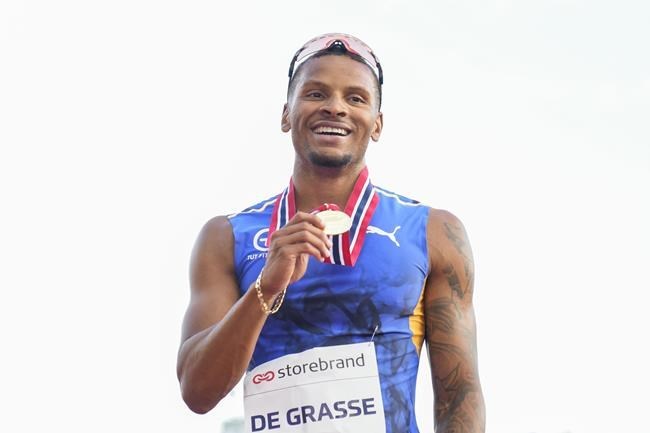Andre De Grasse is keeping patient in search of his old form.
The six-time Olympic medallist and reigning 200-metre Olympic champion entered this year coming off a trying 2022 season dealing with a foot injury.
Having not yet run a qualifying time for August's world championships in both the 100 and 200 and the qualifying window closing Sunday, he looks to bring his best at this week's national trials when it counts most — as he's built himself a reputation for doing.
"That was tough coming back from that (injury), trying to just get back into that form," he said. "Right now, it might take a while but got to keep being patient and persevering and telling myself that I'm gonna get through this hump.
"Of course I'm back healthy now but just trying to find those gears again. I'm feeling good mentally, so my body just has to get back to physical form."
"Just hoping the weather co-operates and trying to put down a good time to get myself into the world champs with that," added De Grasse, who will don the Kids Help Phone logo on his uniform and have its staff and volunteers rooting for him in the stands.
While he works his way back, however, something he started years back has taken on a form of its own.
The Andre De Grasse Future Champions Scholarship Program launched in 2018 with the goal of helping high school student-athletes find success both on and off the track.
The program covers an athlete's annual club fees, provides a $500 travel grant, funding for training and competition gear, financial support to their personal coach ($500) and also invites them to attend a speaker series with professionals in sport nutrition, university recruiting and scholarships and mental performance.
It also includes coaching and mentorship from former Canadian Olympic sprinter Tony Sharpe, who was a finalist in the men's 100 and won bronze in the 4x100 relay at the 1984 Olympics.
Sharpe, who is also a two-time Athletics Canada Development Coach of the Year winner, uses the program to teach athletes key information.
"I created a program based on what I view as pitfalls in my career," he said. "So trying to fill some of those voids in terms of mentorship that I didn't get or anything that could be more beneficial than what I got.
"It's sort of like a redemption, almost, for me to have this opportunity … a training program with outside resources in terms of education, whether it be medical or psychological, sports med or nutrition. Some things that were lacking in my day, right?"
The program consisted of 16 athletes during the 2022-23 school year and has had seven athletes receive NCAA scholarships, including two (Jennessa Wolfe, Savannah Blair) from this past year.
Another six from the 2022-23 class will be at this week's national championships: Bolu Ariyo (under-20 long jump, triple jump), Faziki Musanganya (U20 triple jump), Jaffar Phudjo (U20 400), Marilou Djida (U20 long jump, triple jump), and Iyimi Fagbamiye (U20 110 hurdles).
"That's a great feeling just to know that I'm able to be such a great help to these athletes. They are the future, they are the next generation," De Grasse said.
"I just want to continue to pay it forward, I was fortunate enough to have that same support and look where it got me … out of all those athletes, you might find the next Andre De Grasse."
Wolfe of Valley, N.S., recently committed to the University of Maryland for the upcoming fall. The 17-year-old is also among the 20 athletes — including Blair — set to represent Canada at the U20 Pan American Championships in Mayaguez, Puerto Rico from Aug. 4-6, competing in the women's high jump.
For Wolfe, the program helped most in learning about nutrition and gaining recognition.
"I think it helped me greatly. I really wanted to apply to a scholarship … to have better opportunities since I'm so far in Nova Scotia," she said. "I feel like it's hard to get recognized over here.
"The coaches there were able to help me out and talk to other coaches for school next year and I think they've done a great job of getting me to where I would like to be."
From Sharpe's end, it's mainly about helping them get free schooling.
"There truly is no professional track if you really think about it, and … truly only a very tiny per cent of kids who'll ever make a living running," he said.
"So for me, the greatest value is utilizing that athletic ability to gain a free education."
This report by The Canadian Press was first published July 27, 2023.
Abdulhamid Ibrahim, The Canadian Press



